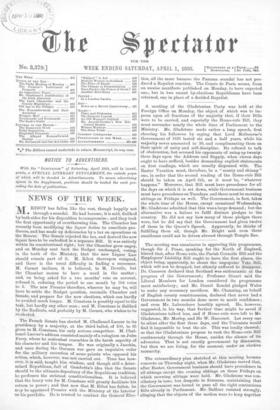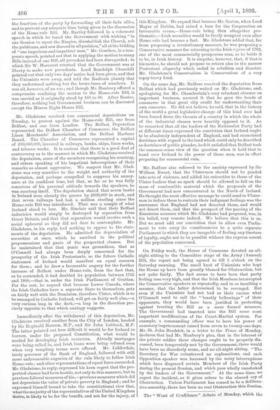The extraordinary plan sketched at this meeting became concrete on
Thursday night, when Mr. Gladstone moved that, after Easter, Government business should have precedence in all sittings except the evening sittings on those Fridays on which morning sittings were held. Mr. Gladstone was con- ciliatory in tone, but despotic in firmness, maintaining that the Government was bound to pass all the eight contentious Bills already in Parliament. Mr. Balfour resisted strongly, alleging that the objects of the motion were to keep together the fractions of the party by forwarding all their fads alike, and to prevent any adequate time being given to the discussion of the Home-rule Bill. Mr. Bartley followed in. a vehement speech in which he taxed the Government with wishing "in one Session to upset the Empire, disestablish the Church, rob the publicans, and sow discord in all parishes," all at the bidding of "one imperious and impatient man." Mr. Goschen, in a tem- perate speech, pointed out that in applying the motion to many Bills instead of one Bill, all precedent had been disregarded ; to which Sir W. Harcourt retorted that the Government was at liberty to make new precedents. Lord Randolph Churchill pointed out that only two days' notice had been given, and that the Unionists were away, and told the Radicals plainly that they understood nothing but the brute-force of numbers. It was all, however, of no use; and though Mr. Hanbury offered a compromise confining the motion to the Home.rule Bill, it was carried as it originally stood by 168 to 88. After Easter, therefore, nothing but Government business can be discussed except the Miners Eight-Hours Bill.



































